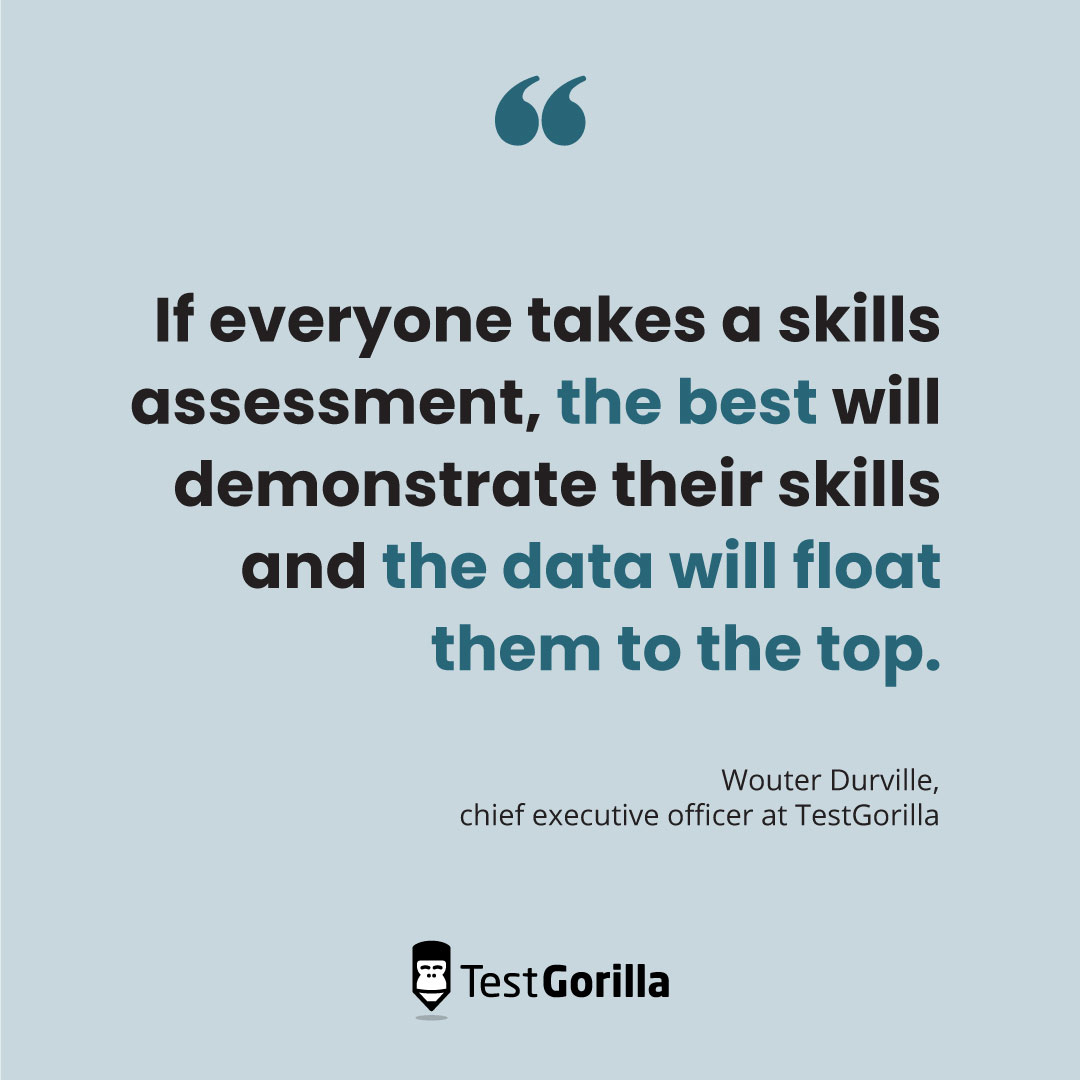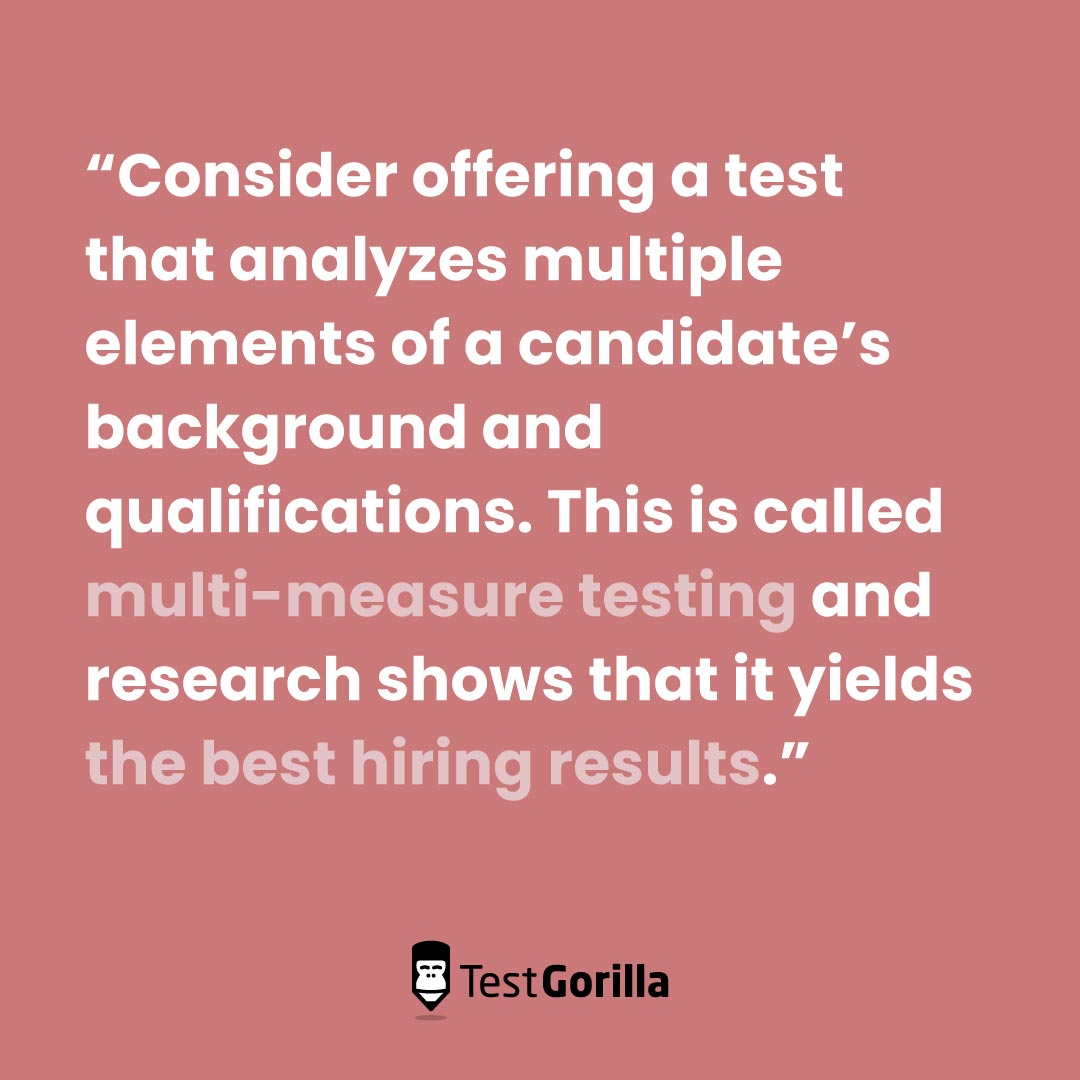More and more organizations are turning to skills-based hiring for one simple reason: The old way of doing things doesn’t work.
Resume-based hiring is an inefficient process that often leads to costly mis-hires – likely due to candidates inflating their resumes. In a recent study, over half of job applicants reported that they intentionally lied on a resume in order to seem more qualified for a job.
In our 2022 report, The State of Skills-Based Hiring, we discovered that offering a skills-based assessment at the very beginning of the hiring process dramatically improves recruitment.
That’s because skills-based hiring is incredibly efficient. Among the companies we surveyed who used skills-based hiring, 92.5% saw a reduction in mis-hires, and 91.4% saw a reduction in time to hire.
In the words of our co-founder and CEO, Wouter Durville, “If everyone takes a skills assessment, the best will demonstrate their skills and the data will float them to the top.”
But how do you choose what to test in order to properly fill an open role? A combination we recommend includes role-specific, personality and culture, and situational judgment tests, woven together to create a well-rounded assessment of any applicant’s skills.
You can, of course, add other types of tests to this combination, depending on the job you’re hiring for. But using this combination as the core of your assessment gives great insights into how a candidate will perform in a role.
Table of contents
Role-specific tests combat resume inflation
A role-specific test is designed to gauge skills specifically related to the main responsibilities of a role.
For example, if you’re hiring for a growth marketing position, you might want to offer an assessment on digital advertising best practices. That way, you can tell right away if someone knows the difference between Google Ads and Meta Ads Manager.
Why they’re useful: We think every hiring manager would agree the best candidate is one who has a firm grasp of the responsibilities of a role.
That’s where a role-specific test comes in. It ensures your candidates truly have the hard skills they need to do the job effectively – and checks that they haven’t inflated their resume.
How to use them: Role-specific tests are useful for workplaces of all sizes, from startups to enterprise level businesses, to measure a candidate’s specific knowledge-level in their industry.
Startups often look at candidates who have some experience or background, but also want to ensure the candidate is able to grow in the role as the company evolves. In this case, offering a role-specific test in combination with other more qualitative tests would tease out strong candidates.
For enterprise level companies, role-specific tests help to find someone who’s well-versed in the industry and is already considered an expert in their field.
You might even find it useful to combine a few role-specific tests together to check for a skill set that hits on multiple areas of expertise, like testing for a growth marketer that’s well-versed in Google Ads along with technical SEO.
Personality and culture tests identify diverse potential
These days, most companies want to hire for culture add. This means seeking candidates who bring their own diverse experiences and perspectives to the table – not just a carbon-copy of your company’s own values.
Build an assessment that tests for culture add in order to objectively look at someone’s values and behaviors.
Why they’re useful: This kind of assessment helps hiring managers gain a fast understanding of who your candidates are and how they might work with their new team. Personality and culture add tests also give a glimpse into candidates’ traits and preferences in areas like motivation and outlook.
The end result is hiring a candidate who can not only perform the duties as outlined in a job description, but also add to the existing energy of your team.
How to use them: Personality and culture-add tests are a great way to get to know your candidates better at a deeper level. That’s because they invite candidates to a self-evaluation, where they get to reflect on and share the traits and preferences that make them unique.
These tests are particularly useful when combined with a follow-up conversation. Treat questions from a personality or culture add test as themes, like conversation openers, and get to know your candidates at a deeper level in an interview.
Situational judgment tests screen candidates’ soft skills
“Able to thrive in a fast-paced environment.”
You’ve likely come across some variation of this phrase on a job description before. And we’re willing to bet that most applicants would claim to be cool under pressure. But how do you tell who’s truly able to work through a stressful situation?
A situational judgment test is designed to simulate the situations a candidate is likely to encounter in the role – like hectic deadlines, difficult conversations, and making sound judgment calls.
Situational judgment tests look at soft skills, evaluating areas like communication styles, time management, and self-motivation.
Why they’re useful: Strong situational judgment is particularly useful for roles that require decision-making, context-switching, or hard and fast deadlines. Situational judgment tests show you how well a candidate can identify important information in a real-life work scenario and then use that information to plan, prioritize, and make decisions in a way that leads to the best possible outcomes.
Situational judgment tests are also useful for combating affinity bias. For example, if you went to UCLA for business and felt like you gained a ton of experience by working under fast deadlines, you’re likely to think a candidate from the same college has a similar ability.
In this case, offering a situational judgment test can help you make a better hiring decision based on someone’s actual experience, rather than where they went to school.
How to use them: Use situational judgment tests to measure relevant soft skills in your candidates. Whether you’re hiring support agents that need strong communication skills, team leads that need strong management skills, or even directors that need a strong business acumen, a situational judgment test can give you important information that no job-specific test can provide.
Situational judgment tests show you how candidates navigate situations using not “hard data” and job knowledge, but rather soft skills that allow them to filter and respond to the right context.
Make skills-based hiring work for you
We know that companies that focus on skills during the hiring process see high levels of employee satisfaction and engagement. As much as 72.1% of employees recruited via skills-based hiring reported being happy or very happy in their roles.
There’s a good reason why skills-based hiring sees meaningful results. In Wouter’s words: “Hiring becomes faster and more exciting – you focus your time on the top people and hear their stories. You get to spend your time in a very qualitative, meaningful way.”
Ready to use skills-based hiring at your organization? The first step is to decide what tests to use. As we explained earlier, no test should be used alone to make a hiring decision. This is why we’ve built a library bursting with top-tier tests ready for you to use.
Consider offering a test that analyzes multiple elements of a candidate’s background and qualifications. This is called multi-measure testing and research shows that it yields the best hiring results.
When used in combination, these tests are better able to predict how a person will actually perform in the job. Pull in tests for role-specific skills, culture and personality, and situational judgment abilities to create an effective and holistic skills assessment.
Related posts
Hire the best candidates with TestGorilla
Create pre-employment assessments in minutes to screen candidates, save time, and hire the best talent.
Latest posts
The best advice in pre-employment testing, in your inbox.
No spam. Unsubscribe at any time.

Hire the best. No bias. No stress.
Our screening tests identify the best candidates and make your hiring decisions faster, easier, and bias-free.
Free resources
This checklist covers key features you should look for when choosing a skills testing platform
This resource will help you develop an onboarding checklist for new hires.
How to assess your candidates' attention to detail.
Learn how to get human resources certified through HRCI or SHRM.
Learn how you can improve the level of talent at your company.
Learn how CapitalT reduced hiring bias with online skills assessments.
Learn how to make the resume process more efficient and more effective.
Improve your hiring strategy with these 7 critical recruitment metrics.
Learn how Sukhi decreased time spent reviewing resumes by 83%!
Hire more efficiently with these hacks that 99% of recruiters aren't using.
Make a business case for diversity and inclusion initiatives with this data.





















